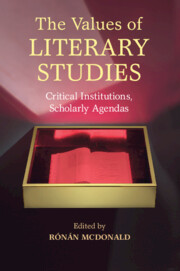Book contents
- Frontmatter
- Contents
- Notes on Contributors
- Acknowledgments
- Introduction
- 1 The Value of Criticism and the Project of Modernism
- 2 Caprice: Individual Subjectivity in Literary Criticism
- 3 The Phenomenology of Literary Valuation
- 4 Literature Is History: Aesthetic Time and the Ethics of Literary Will
- 5 Dead on Arrival: Time and the Value of Old Books
- 6 The Price of Value
- 7 To Shelter the Nothing That Happens
- 8 When Literary Criticism Mattered
- 9 Literature among the Objects of Modernist Criticism: Value, Medium, Genre
- 10 “Vale!” : Psychoanalysis, Value, and Literature
- 11 Afterlives of Comparison: Literature, Equivalence, Value
- 12 Feminism, Gender, and the Literary Commons
- 13 The Value of World Making in Global Literary Studies
- 14 Multiple Versions and Fictional Minds: Manuscript Research, Digital Editing, and Enactive Cognition in Literary Studies
- 15 After Suspicion: Surface, Method, Value
- 16 Literary Experience and the Value of Criticism
- Index
7 - To Shelter the Nothing That Happens
Published online by Cambridge University Press: 05 November 2015
- Frontmatter
- Contents
- Notes on Contributors
- Acknowledgments
- Introduction
- 1 The Value of Criticism and the Project of Modernism
- 2 Caprice: Individual Subjectivity in Literary Criticism
- 3 The Phenomenology of Literary Valuation
- 4 Literature Is History: Aesthetic Time and the Ethics of Literary Will
- 5 Dead on Arrival: Time and the Value of Old Books
- 6 The Price of Value
- 7 To Shelter the Nothing That Happens
- 8 When Literary Criticism Mattered
- 9 Literature among the Objects of Modernist Criticism: Value, Medium, Genre
- 10 “Vale!” : Psychoanalysis, Value, and Literature
- 11 Afterlives of Comparison: Literature, Equivalence, Value
- 12 Feminism, Gender, and the Literary Commons
- 13 The Value of World Making in Global Literary Studies
- 14 Multiple Versions and Fictional Minds: Manuscript Research, Digital Editing, and Enactive Cognition in Literary Studies
- 15 After Suspicion: Surface, Method, Value
- 16 Literary Experience and the Value of Criticism
- Index
Summary
Do literary studies have any value? It is a question clearly related to that of the existence of literature per se, which we are no closer in 2015 to having settled, despite decades of revanchist positivism in the discipline. Thirty years after Terry Eagleton summed up a decade's worth of thinking on the matter by claiming emphatically “not only that literature does not exist in the sense that insects do, and that the value-judgments by which it is constituted are historically variable, but that these value-judgments themselves have a close relation to social ideologies,” we appear rather to have sidestepped the outrage than to have addressed it. If there is no such thing as literature, then it can have no value, and the critical study of it must be valueless indeed, which is scarcely an implication any tenured professionals in the trade could be counted upon to endorse. Or else, if our basic business is to “constitute” the being of literature through historically variable, ideological value judgments, then we are caught in the repetitive act of extracting the very values that we have always already put there. The “value of literary studies” would thereby consist in the tautological art of projection upon and extraction from an inexistent object of a set of preexistent guild “values,” the effect of which is to make literature appear, to produce it as a social and cultural good. Without us, it would not exist, but flicker out into the meaningless babble of the world. But with us, it exists only at the cost of vindicating our values, and not its own.
This becomes critical in situations in which “our values” are no longer our own, as is too clearly the case in the neoliberal university today. As distinct from an earlier, postwar corporatist moment in the history of Western states, when the claims of capital over the logic of social spending were checked by a buoyant job market, high wages, and soaring union participation, the neoliberal hegemony is characterized by a dismantlement of those checking mechanisms – the effect of which is a collapse of the state's responsibility to enshrine any values other than those of capital. Which is to say that, today, value is simply value, value as such: “Worth or quality as measured by a standard of equivalence” (most usually money, Oxford English Dictionary).
- Type
- Chapter
- Information
- The Values of Literary StudiesCritical Institutions, Scholarly Agendas, pp. 105 - 119Publisher: Cambridge University PressPrint publication year: 2015

